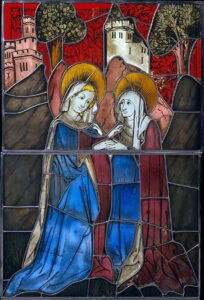Feast Day: June 24 (Birth of John the Baptist)

In his poem “St. John’s Night,” Thomas Merton paints his childhood memories of watching the sun set over southern France’s rolling hills, rows of distant grape vines turning blue in the late summer haze, until darkness fell and flames began to blossom across the high places. This was the traditional vigil of the Feast of the Birth of St. John the Baptist. It’s not part of the liturgy; some speculate the fires continue an unchristian summer solstice tradition from one or more of Europe’s pre-Christian cultures. Today it’s often an excuse to stay up late around a bonfire and drink. Merton calls them simultaneously “pagan and converted” fires with reason.
There can be something holy just coming together around a campfire with friends. It depends on the kind of community you have. I’ve spent a lot of time around campfires during my misspent youth in Scouting and afterwards. There’s a confessional air in the flicker of coals under the shroud of smoke. Guys I’ve known who never talk about themselves start to open up. The rest of the world is cut off in darkness beyond the light of the fire, and you can’t help but grow more attentive to the handful of illuminated faces left in your circle. Or, of course, you could just get drunk with people you don’t really know instead.
The Miracle of Birthdays
The birth of John the Baptist is an unusual feast. The Church calls most saints feast days natalis— birthdays—because they traditionally mark the day the saint is born in heaven: that is, their date of death. We celebrate that too with John in August, but this June day celebrates his actual human birth in this world. That makes it a special day, a celebration of something both worldly and spiritual.
The celebration of birth as significant for both this world and the next should be true for every child. When John’s father Zechariach sings his Benedictus, the song of joy still prayed every morning by priests, he rejoices at the first steps of salvation for all people that God has promised to bring through his son: “the daybreak from on high will visit us to shine on those who sit in darkness and death’s shadow, and to guide our feet into the path of peace”(Lk 1:78-79). The Church singles out John because he is one of God’s miraculous and loving lights in the darkness. Yet some of Zechariah’s joy is surely the joy of any father. Every child has that potential to reveal God’s love to others in their lives. I think the first spark of that light begins with the parents and rest of the community scattered around him or her: the baby’s soft and fragile face ignites the fires of charity in them.
Communities of Charity in Pregnancy and Beyond

John had a small community of charity around him. Gabriel tells Mary that her cousin Elizabeth was six months pregnant with John at the Annunciation (March 25). Mary rushes to Elizabeth, who feels John’s prophetic leap in her womb. Mary, moved by joy at seeing Elizabeth’s pregnancy and at hearing the loving confirmation of God’s word from Elizabeth, responds with her own Magnificat (prayed by priests every evening). Then there is a single Gospel verse, nestled between the two beautiful canticles: “Mary remained with her about three months and then returned to her home” (Lk 1:56). Mary spends the last three months of Elizabeth’s pregnancy (from March to John’s birth in June) helping. Perhaps she also benefits from the older woman’s guidance as she faces the physical changes of the first trimester.
Many are blessed with that community of love as they give birth and then care for their newborn. Parents, siblings, or friends may all help celebrate that miracle and provide a much needed extra pair of arms. Employers may be supportive. Others are not so blessed. Family may be far away, employers unreasonable. When Mary gave birth six months after Elizabeth, she did so in a strange town with only her husband for support. Some people don’t have even that support. Perhaps people who may live or work close to us might be in need of some support.
That’s the thing with events in this world. Our lives are full of chances to bring a little spark of divine love into our communities. Perhaps it’s a big thing like supporting a mother and her child before and after birth. Perhaps it’s small things like actually talking to people who are important to us or listening to another person’s problems. We can’t be present to everyone as much as we’d like—I know my friends are scattered across the country and beyond—but there are opportunities in our backyards if we look.
I’m not very good about reaching out. I know I squander many of these chances to do good. I don’t think I’m alone. There wouldn’t be today’s crisis of loneliness otherwise.
Final Thoughts
Celebrating the day a saint reaches heaven makes sense. It’s glorious. That celebration can move us to hope as our eyes lift up to our final goal. I’m glad though we also have this day to celebrate a human birth with all its potential for good or bad. Due to the miracles surrounding John’s birth, “All who heard these things took them to heart, saying, ‘What, then, will this child be?'” (Lk 1:66). We should ask that with each child. We should help make that answer glorious. We should do the same with all the smaller chances that come our way to show love to our family, our neighbors, and our acquaintances or colleagues who need a listening ear.
So let us ask, where do I have the opportunity to help fulfill the potential for growing God’s love? Who in my community am I being called to serve now in little or large ways?
Merton rejoiced to see all those fires in his youth “wake wide as faith, opening their fire and innocent eyes from hill to hill.” May we light such fires of charity always in our lives.
If you have a response, thoughts, or questions, please comment at the bottom of the page. Consider subscribing below to get weekly email notifications about new reflections and other news.


